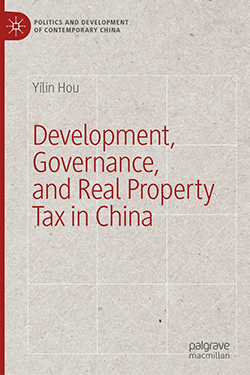
In his recently published book, Yilin Hou, professor of public administration and international affairs, examines the general principles for designing and implementing a modern property tax in transitional economies. The book, Development, Governance, and Real Property Tax in China (Palgrave MacMillan, 2018), represents part of an expansive study on local property taxes that also includes Hou’s former work, The Property Tax in China: History, Pilots, and Prospects (Springer, 2014).
Utilizing China as a case study, Hou draws on micro-level housing data to argue that a real property tax would ameliorate inequities and inefficiencies in the current system of education financing. He then outlines the various institutional obstacles that stall and complicate the implementation of a property tax in China. From here, Hou establishes six principles that policy makers should consider when designing the tax and elaborates several strategies for putting these principles into practice. Ultimately, Hou strikes an optimistic tone about the future of the property tax in China and how it might be used to improve governance and achieve equitable economic growth throughout the country.
Hou, also a Tenth Decade Faculty Scholar and a senior research associate at Maxwell’s Center for Policy Research, is a leading scholar of public finance. He specializes in fiscal policy, public budgeting, and intergovernmental fiscal relations in development and governance. His research focuses on how government finance can weather boom-bust cycles within the economy. Hou is the editor of the Development and Governance and Studies in Public Budgeting (and Fiscal Policy) book series’. In addition, he serves on the editorial board of several major academic journals. He received a PhD in public administration from the Maxwell School in 2002.
From the Publisher
This book offers an analysis of China in its muddling through of financial reforms towards adopting a local real property tax. The research is designed to serve dual purposes. First, it is an effort to provide an independent perspective on an urgent public policy under consideration by the Chinese government and to reflect upon this policy’s process, which started over a dozen years ago yet is still in the fermenting stage with no sight of fruition.
Additionally, this project is intended to share China’s experience with other developing and transitional countries, so they can discern the difficulties China has faced and understand what may entangle them in the modernization of their taxation systems.
Related News
Commentary

Nov 19, 2024
Commentary

Nov 19, 2024
Commentary

Nov 18, 2024
